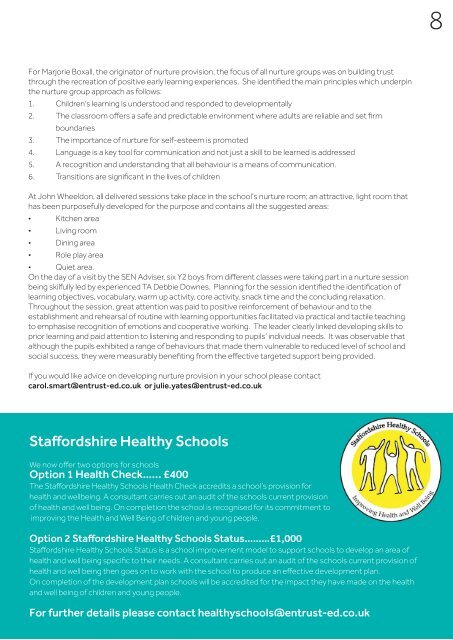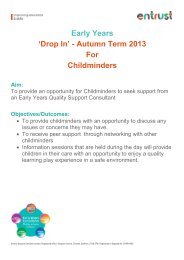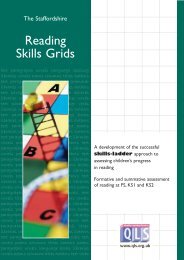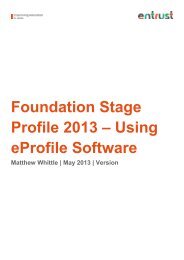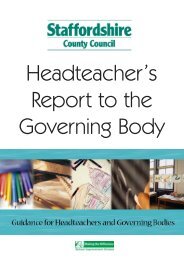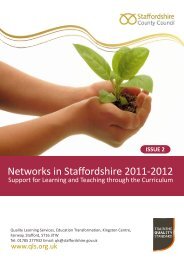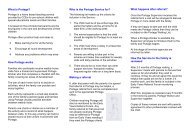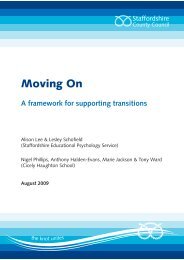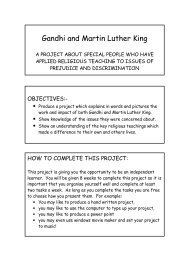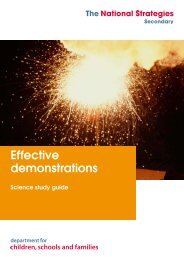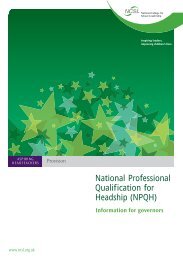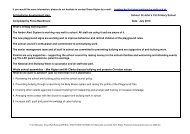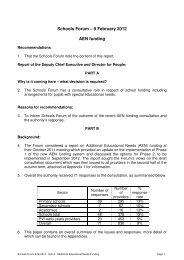SEN Newsletter - Summer 2013 - Staffordshire Learning Net ...
SEN Newsletter - Summer 2013 - Staffordshire Learning Net ...
SEN Newsletter - Summer 2013 - Staffordshire Learning Net ...
Create successful ePaper yourself
Turn your PDF publications into a flip-book with our unique Google optimized e-Paper software.
For Marjorie Boxall, the originator of nurture provision, the focus of all nurture groups was on building trust<br />
through the recreation of positive early learning experiences. She identified the main principles which underpin<br />
the nurture group approach as follows:<br />
1. Children's learning is understood and responded to developmentally<br />
2. The classroom offers a safe and predictable environment where adults are reliable and set firm<br />
boundaries<br />
3. The importance of nurture for self-esteem is promoted<br />
4. Language is a key tool for communication and not just a skill to be learned is addressed<br />
5. A recognition and understanding that all behaviour is a means of communication.<br />
6. Transitions are significant in the lives of children<br />
At John Wheeldon, all delivered sessions take place in the school’s nurture room; an attractive, light room that<br />
has been purposefully developed for the purpose and contains all the suggested areas:<br />
• Kitchen area<br />
• Living room<br />
• Dining area<br />
• Role play area<br />
• Quiet area.<br />
On the day of a visit by the <strong>SEN</strong> Adviser, six Y2 boys from different classes were taking part in a nurture session<br />
being skilfully led by experienced TA Debbie Downes. Planning for the session identified the identification of<br />
learning objectives, vocabulary, warm up activity, core activity, snack time and the concluding relaxation.<br />
Throughout the session, great attention was paid to positive reinforcement of behaviour and to the<br />
establishment and rehearsal of routine with learning opportunities facilitated via practical and tactile teaching<br />
to emphasise recognition of emotions and cooperative working. The leader clearly linked developing skills to<br />
prior learning and paid attention to listening and responding to pupils’ individual needs. It was observable that<br />
although the pupils exhibited a range of behaviours that made them vulnerable to reduced level of school and<br />
social success, they were measurably benefiting from the effective targeted support being provided.<br />
If you would like advice on developing nurture provision in your school please contact<br />
carol.smart@entrust-ed.co.uk or julie.yates@entrust-ed.co.uk<br />
<strong>Staffordshire</strong> Healthy Schools<br />
We now offer two options for schools<br />
Option 1 Health Check…... £400<br />
The <strong>Staffordshire</strong> Healthy Schools Health Check accredits a school’s provision for<br />
health and wellbeing. A consultant carries out an audit of the schools current provision<br />
of health and well being. On completion the school is recognised for its commitment to<br />
improving the Health and Well Being of children and young people.<br />
Option 2 <strong>Staffordshire</strong> Healthy Schools Status………£1,000<br />
<strong>Staffordshire</strong> Healthy Schools Status is a school improvement model to support schools to develop an area of<br />
health and well being specific to their needs. A consultant carries out an audit of the schools current provision of<br />
health and well being then goes on to work with the school to produce an effective development plan.<br />
On completion of the development plan schools will be accredited for the impact they have made on the health<br />
and well being of children and young people.<br />
For further details please contact healthyschools@entrust-ed.co.uk<br />
8


